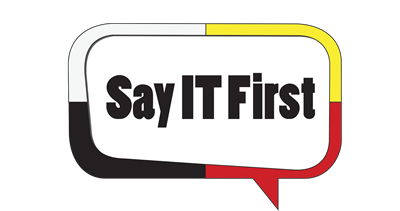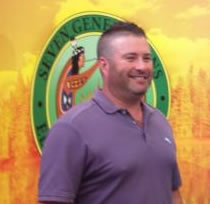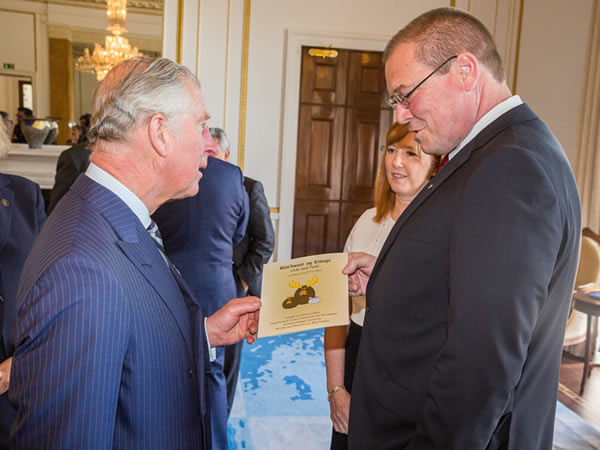
Heather and Mike Parkhill were invited by His Excellency Gordon Campbell, the High Commissioner for Canada to the United Kingdom, to represent their efforts to support Indigenous literacy through the Prince’s Charity in Canada. The invitation was for a tour of the newly renovated Canada House in London, England, attended by Their Royal Highnesses, the Prince of Wales and Duchess of Cornwall. The book His Royal Highness is holding is SayITFirst's first Mi'Kmaw book, “Mim’kwasi aq Kimapi” or “Hide and Peek”, translated by the Natoaganeg Mi’Kmaq Language Committee, edited by Kristine Thornley, published by SayITFirst.
After seeing the dire erosion of Indigenous languages caused by a systematic program of assimilation, Heather and Mike Parkhill couldn’t sit back any longer, they needed to help motivated Indigenous cultures revitalize Native Languages through the innovative use of computer and learning technologies. They felt this diversity, combined with Elder, linguist and Native community knowledge offers a unique potential to provide solutions to reclaim endangered languages. In recognition of his support for those doing First Nation language initiatives, Mike Parkhill was awarded the 2015 Order of Ontario on January 20, 2016 and the Governor General’s Meritorious Service Medal in July 2016.
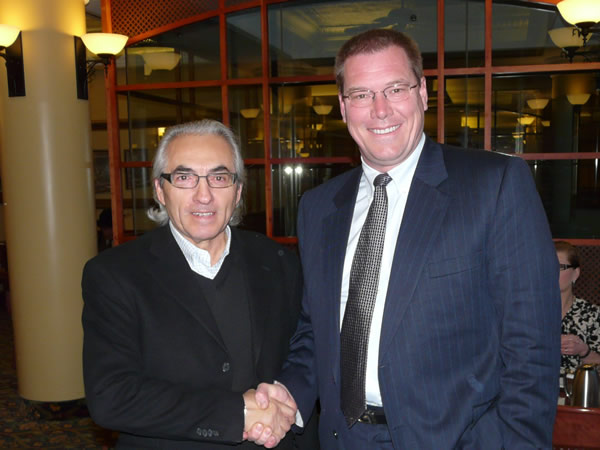
Phil Fontaine, National Chief of the Assembly of First Nations and Mike Parkhill, Founder of SayITFirst, at the Council of Education Ministers, Canada - Summit on Aboriginal Education, Saskatoon, February 2009.
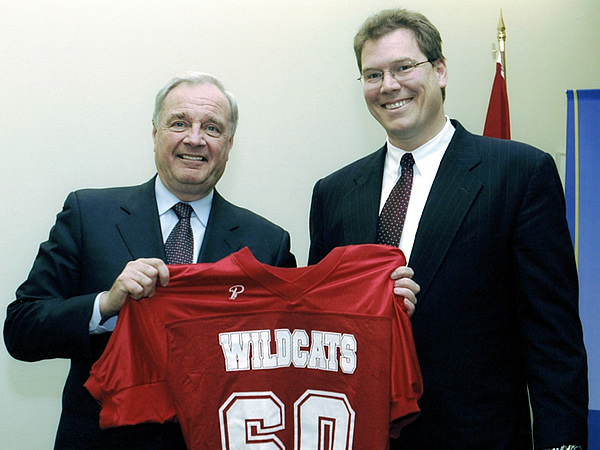
Mike Parkhill, attending the Innovative Teachers’ Awards (2005) with the Right Honourable Paul Martin, then Prime Minister of Canada, holding a jersey from the Georgetown, Ontario Wildcats football team which Mike volunteer-coached for many years.
From 2009, Heather and Mike have supported social change initiatives through helping incredible people willing to commit to the higher moral purpose of solving Indigenous Literacy and Ancestral Language revitalization. SayITFirst has worked with organisations like the Prince’s Charity Canada, Microsoft Canada, New Brunswick Department of Education, First Nations Education Initiatives Inc., the New Brunswick Minister's Council on 21st Century Learning, the Rainy River District School Board, over two dozen First Nations and the Ontario Ministry of Education.
Mike was previously Director, Academic Sector at Microsoft Canada where he worked with the Government of Nunavut and the Pirurvik Centre to modernize over 860,000 words and phrases in Inuktitut, and to build an MS Windows and Office interface in Inuktitut.
What Responsibility are You Willing to Assume?
When you receive a message, no matter what its source, you may ask yourself ‘what does it mean'? As SayITFirst founder, Mike Parkhill, has learned, the question is framed more like ‘What responsibility am I to assume based on the message I just received?’
Mike was working as a director with Microsoft Canada when he received a message. He had been tasked with a project involving the Nunavut Government and modernizing the Inuktitut language. Having little knowledge of the region, he headed there to meet with a local contact named Lena Evic who was to provide Mike with the background and details so he could get to work. Little did he realize the impact that visit would have.
It was during that initial conversation with Leena that he learned the local economy, that had once flourished when it was a land-based economy, had shifted to a wage-based economy when settlers moved into the Territory. Before they could talk business, Lena’s quiet and calming nature helped reveal the beauty of a rich culture that had changed before her eyes. She needed Mike to understand the bridging of time before coming in and trying to make changes.
As a director with Microsoft, many of Mike’s responsibilities could be distilled down to numbers. Either the team achieved targets at year end or they didn’t. But there was something about the experience in Nunavut that shifted Mike’s way of thinking. He began to seek a more fulfilling journey that would add meaning to his life. He recalls one conversation with a sales rep on his team who told him that he was the best manager they ever had. Mike asked, ‘How so?’ in order to magnify what he was doing and pass it on to others. “You shield stuff from rolling down hill,” he said. “You free me up so I can spend more time with my customers.”
An image flashed before his eyes. Mike envisioned a path leading to a fork in the road. At the end of each road was a headstone. One said "Mike Parkhill, he was great at shielding stuff from rolling downhill." The other said, "Mike, he made a difference with his life." One could say it was intuition, another could say the vision was Spiritual, it doesn't matter, the message evoked action. Mike decided on the spot he needed to do something different with his life and career – something involving working with Aboriginal people to restore the language that the Assimilation policies had so mercilessly eroded. It was not giving the Native People a hand out, but rather working in concert with them to revitalize the rich traditions reflected through the language given to them by their Creator.
Not long after he resigned from Microsoft Canada, on December 3, 2008, Mike awoke from a deep sleep with what he believed to be a clear image of how to save Native languages from their rapid erosion. Mike thought, if communities could collect all of their language knowledge to be digitized and displayed for all to access, then teachers and parents could have a chance to transfer the knowledge on to future generations. Things began to move quickly from there.
Mike met with members of the local New Brunswick Native bands and found them to be initially skeptical. When he started to outline the idea of developing an online repository of words and introduced the notion of crowd sourcing to be driven by a team of Native groups and Elders, the local leaders began to see the potential for this initiative. The project started with the goal to get community groups and individuals to populate and record 2000 words to be displayed in one location. The communities ended up inputting 10,000 Mi’kmaw words and 4,000 Maliseet words. The team learned how to record the words to display them on a website where they could be accessed freely by anyone interested in helping themselves with vocabulary, pronunciation and spelling.
Mike’s journey continues as he works in partnership with the First Nations Education Initiative Inc. of New Brunswick, the Rainy River District School Board, Seven Generations Education Institute and the Rainy River District First Nations to develop children’s books written in English, the Native language and phonetic representation. This technique was developed by Veronica Atwin, a well known Maliseet linguist and educator from 1950 through 1989. Through a Heritage Canada Aboriginal Languages Initiative, SayITFirst Inc., with Corporate Films Canada, also develops children’s videos and support materials for educational use. A key component to language vitality is the response to the medium of TV and computers. To underpin the revitalization effort, a unique partnership with Microsoft's Translator Hub technology has emerged to digitize the entire language so future generations can enjoy the gifts it brings.
What responsibility are you willing to assume?
